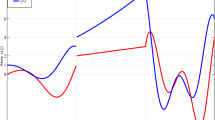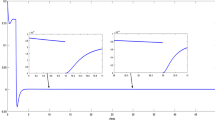Abstract
For linear discrete-time systems, the traditional finite horizon optimal controller is proved to render the closed-loop systems asymptotically stable under some assumptions in literature. In this paper, a new form of finite horizon discrete-time Riccati equation is proposed. It is proved that the new form of finite horizon discrete-time Riccati equation is equivalent to the other three old ones. Based on this new form of finite horizon discrete-time Riccati equation, the finite horizon optimal controller of linear discrete time systems is proved to render the closed-loop system exponentially stable without any assumptions. At the same time, a new form of infinite horizon discrete-time Riccati equation is proposed when the discrete system is controllable or stabilizable. It is proved that the new form of infinite horizon discrete-time Riccati equation is equivalent to the other three old ones too. Based on this new form of infinite horizon discrete-time Riccati equation, the infinite horizon optimal controller of linear discrete-time systems is proved to render the closed-loop system exponentially stable when the open-loop system is either controllable or stabilizable. Finally an unstable batch reactor and an unstable inverted pendulum are used to verify the theory results of this paper.
Similar content being viewed by others

References
M. Aoki, “Control of linear discrete-time stochastic dynamic systems with multiplicative disturbance,” IEEE Trans. on Automatic Control, vol. 20, no. 3, pp. 388–392, June 1975.
M. Athans, R. Ku, and S. Gershwin, “The uncertainty threshold principle: some fundamental limitations of optimal decision making under dynamic uncertainty,” IEEE Trans. on Automatic Control, vol. 22, no. 3, pp. 491–495, June 1977.
Y. Engin, “Stabilization of deterministic and stochastic-parameter discrete systems,” International Journal of Control, vol. 42, no. 1, pp. 33–41, January 1985.
Y. Engin, “General suboptimal approach to the control and estimation of discrete-time system,” International Journal of System Science, vol. 16, no. 9, pp. 1095–1108, September 1985.
Y. D. Ji and J. C. Howard, “Bounded sample path control of discrete time jump linear systems,” IEEE Trans. on Systems, Man, and Cybernetics, vol. 19, no. 2, pp. 277–284, March 1989.
R. E. Kalman and R. W. Koepcke, “Optimal synthesis of linear sampling control systems using generalized performance indexes,” Trans. ASME, vol. 80, pp. 1820–1826, 1958.
R. E. Kalman, “On the general theory of control,” Proc. of First IFAC, pp. 481–492, 1960.
D. L. Kleinman and M. Athans, “The discrete minimum principle with application to the linear regulator problem,” Electron. Syst. Lab, Mass. Inst. Tech., Cambridge, Mass. 1966.
A. H. Levis, On the Optimal Sampled-data Control of Linear Processes, Sc.D Dissertation, Mass. Inst. Tech., Cambridge, Mass. 1968.
A. H. Levis, M. Athans, and R. Schlueter, “On the behavior of optimal linear sampled-data regulators,” International Journal of Control, vol. 13, no. 2, pp. 343–361, March 1971.
D. Peter and H. L. Alexander, “Optimal linear regulators: the discrete-time case,” IEEE Trans. on Automatic Control, vol. 16, no. 6, pp. 613–620, December 1971.
D. L. Kleinman, “Stabilizing a discrete, constant, linear system with application to iterative methods for solving the Riccati equation,” IEEE Trans. on Automatic Control, vol. 19, no. 3, pp. 252–254, June 1974.
Y. Engin, “Bounds for the eigenvalue of the solution matrix of the algebraic Riccati equation,” International Journal of System Science, vol. 16, no. 7, pp. 815–820, July 1985.
A. H. Gary, D. Res, and L. Michelson etc, “An Iterative technique for the computation of the steady state gains for the discrete optimal regulator,” IEEE Trans. on Automatic Control, vol. 16, no. 8, pp. 382–383, 1971.
K. Tohru, “On the matrix Riccati equation for linear systems with a random gain,” IEEE Trans. on Automatic Control, vol. 21, no. 5, pp. 770–771, October 1976.
R. Nils and J. R. Sandell, “On Newton’s method for Riccati equation solution,” IEEE Trans. on Automatic Control, vol. 19, no. 6, pp. 254–255, December 1974.
Q. X. Zhu and G. M. Xie, “Finite-horizon optimal control of discrete-time switched linear systems,” Mathematical Problems in Engineering, vol. 2012, pp. 1–12, 2012.
S. S. Hu and Q. X. Zhu, “Stochastic optimal control and analysis of stability of networked control systems with long delay,” Automatica, vol. 39, no. 11, pp. 1877–1884, November 2003.
B. Alan and S. Jindi, “Swing-up control of inverted pendulum systems,” Robotica, vol. 14, no. 4, pp. 397–405, July 1996.
J. M. Davis, I. A. Gravege, R. J. Marks II, and A. A. Ramos, “Algebraic and dynamic Lyapunov equations on time scale,” Proc. of 42nd South Eastern Symp. on System Theory, pp. 329–334, 2010.
B. J. Jackson, J. M. Davis, I. A. Gravege, and R. J. Marks II, “Controllability, observability, realizability and stability of dynamic linear systems,” Electronic Journal of Differential Equations, vol. 2009, no. 1, pp. 1–32, April 2009.
Y. S. Shmaliy, “Linear optimal FIR estimation of discrete time-invariant state space models,” IEEE Trans. on Signal Processing, vol. 58, no. 6, pp. 3086–3096, June 2010.
Y. S. Shmaliy and O. Ibarra-Manzano, “Time-variant linear optimal finite impulse response estimator for discrete state-space models,” International Journal of Adaptive Control and Signal Processing, vol. 26. no. 2, pp. 95–104, February 2012.
P. Lancaster and L. Rodman, Algebraic Riccati Equations, Clarendon Press,1995.
T. Pappas, A. J. Laub, and N. R. Sandell, “On the numerical solution of the discrete-time algebraic Riccati equation,” IEEE Trans. on Automatic Control, vol. 25, no. 4, pp. 631–641, August 1980.
J. J. Hench and A. J. Laub, “Numerical solution of the discrete-time periodic Riccati equation,” IEEE Trans. on Automatic Control, vol. 39, no. 6, pp. 1197–1210, June 1994.
A. A. Stoovogel and A. J. T. M. Weeren, “The discrete-time Riccati equation related to the H8 control problem,” IEEE Trans. on Automatic Control, vol. 39, no. 3, pp. 686–691, March 1994.
H. K. Wimmer, “Monotonicity of maximal solutions of algebraic Riccati equations,” Systems & Control Letter, vol. 5, no. 5, pp. 317–319, April 1985.
X. H. Liu and H. S. Xi, “On exponential stability of neutral delay Markovian jump systems with nonlinear perturbations and partially unknown transition rates,” International Journal of Control, Automation, and Systems, vol. 12, no. 1, pp. 1–11, January 2014.
Author information
Authors and Affiliations
Corresponding author
Additional information
Recommended by Associate Editor Juhoon Back under the direction of Editor Poo-Gyeon Park.
This work was supported by National Nature Science Foundation of China (51375323, 61164014).
Hongli Liu received her B.S. degree in Mechanical Manufacturing process and equipment from Xi’an Polytechnic University, Xi’an, China, in 1996. She received her M.S. degree in Mechanical Engineering from East China Jiaotong University, China, in 2010. She was with Nantong University, Nantong, China, from July 1996 to July 2006. She was with East China Jiaotong University, Nanchang, China, from August 2006 to February 2013. She is currently a lecturer at School of Mechanical Engineering, Suzhou University of Science and Technology, Suzhou, China. Her research interests include optimal control, servo control, networked control system and the applications of control theory in mechanical engineering.
Qixin Zhu received his B.S. and M.S. degrees in Industrial Automation from Xi’an Polytechnic University, Xi’an, China, in 1994 and 1997, respectively. He received his Ph.D. degree in Control Theory and Control Engineering from Nanjing University of Aeronautics and Astronautics in 2003. He was with Nantong University, Nantong, China, from April 1997 to July 2004. He was with ASM Assembly Automation Ltd., Hong Kong, China, from July 2004 to August 2006. He was with East China Jiaotong University, Nanchang, China, from August 2006 to February 2013. He is currently a professor at School of Mechanical Engineering, Suzhou University of Science and Technology, Suzhou, China. His research interests include servo control, networked control systems, robot and the applications of control theory in engineering.
Rights and permissions
About this article
Cite this article
Liu, H., Zhu, Q. New forms of Riccati equations and the further results of the optimal control for linear discrete-time systems. Int. J. Control Autom. Syst. 12, 1160–1166 (2014). https://doi.org/10.1007/s12555-013-0202-x
Received:
Revised:
Accepted:
Published:
Issue Date:
DOI: https://doi.org/10.1007/s12555-013-0202-x



